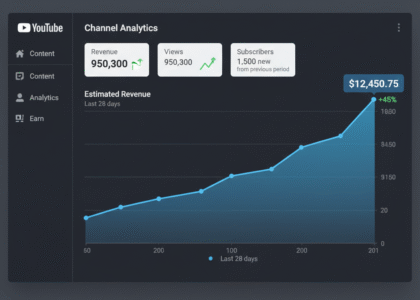What does financial success really mean? For many, it’s about earning a high income, but true wealth goes beyond a paycheck. It’s about making smart money moves, building financial security, and creating a future where money works for you—not the other way around.
In today’s world, financial stability feels harder to achieve. Rising living costs, debt traps, and unpredictable markets make it easy to feel overwhelmed. But the good news? You don’t need a six-figure salary to achieve financial success. What you need is a mindset shift—a new way to think about earning, saving, and investing.
If you’re ready to take control of your financial future, let’s dive into how you can rethink your money and build lasting wealth.
1. Understanding Financial Success: It’s More Than Just Money
When most people think of financial success, they picture luxury homes, fancy cars, or extravagant vacations. But real financial success is about freedom, security, and smart decision-making. It’s having enough money to cover your needs, fund your dreams, and give you peace of mind.
Key Traits of Financially Successful People
- They prioritize financial literacy and make informed decisions.
- They live below their means instead of increasing expenses with income.
- They have multiple income streams to reduce financial risks.
2. Shift Your Mindset: The Foundation of Wealth Building
Your beliefs about money shape your financial habits. If you think wealth is only for the lucky or privileged, you might never take steps to achieve it. Instead, adopt a growth mindset and see financial success as a skill you can learn.
Mindset Shifts to Adopt
- From consumer to investor: Instead of spending on liabilities, invest in assets that generate income.
- From short-term to long-term thinking: Focus on financial stability over quick wins.
- From scarcity to abundance: See money as a tool to grow, not something to fear.
A great way to start is by tracking your spending for a month. Awareness is the first step toward better money management.
3. Smart Budgeting: Master Your Money Flow

A strong budget isn’t about restricting yourself—it’s about directing your money toward what truly matters. Financially successful people know where every dollar goes.
The 50/30/20 Budget Rule
- 50% for needs: Rent, utilities, groceries, insurance.
- 30% for wants: Dining out, entertainment, travel.
- 20% for savings and investments: Emergency fund, retirement, stocks, or side hustles.
Tools to Simplify Budgeting
- Use apps like Mint or YNAB to track spending.
- Automate savings to ensure consistency.
- Reduce unnecessary expenses by eliminating subscriptions you don’t use.
4. Eliminate Debt: Break Free from Financial Chains
Debt can be a major roadblock to financial success, but with the right strategy, you can take control.
Steps to Pay Off Debt Faster
- Use the snowball method: Pay off the smallest debts first for quick wins.
- Try the avalanche method: Focus on high-interest debts to save more in the long run.
- Negotiate lower interest rates by calling your lenders and asking for better terms.
Avoid credit card debt by paying your balance in full each month.
5. Increase Your Income: Build Multiple Streams
A single income stream is risky—what happens if you lose your job? Financially successful people create multiple income sources to secure their future.
Ways to Earn More: financial success
- Invest in stocks and real estate for long-term growth.
- Start a side hustle like freelancing, blogging, or selling digital products.
- Upskill and ask for a raise by learning high-income skills and negotiating salary.
Passive income streams, such as dividends, rental income, or online courses, can help you earn money even while you sleep.
6. Save and Invest Wisely: Let Your Money Work for You

Saving money is great, but investing is what truly builds wealth. The earlier you start, the more you benefit from compound interest.
Investment Strategies for Beginners: financial success
- Stock market: Start with ETFs or index funds for diversified growth.
- Real estate: Rental properties can provide passive income.
- Retirement accounts: 401(k) and IRA accounts offer tax advantages.
Invest consistently and think long-term instead of chasing quick profits.
7. Build an Emergency Fund: Prepare for the Unexpected
Financial security isn’t just about growing wealth—it’s also about protecting it. Unexpected expenses can derail your progress, so having a financial cushion is crucial.
How Much to Save?: financial success
Aim for three to six months of living expenses in a high-yield savings account.
Start small. Even saving $500 can keep you from relying on credit cards for emergencies.
8. Plan for Retirement: Secure Your Future Now
It’s never too early to start thinking about retirement. The sooner you plan, the less financial stress you’ll have later.
Steps to a Strong Retirement Plan: financial success
- Contribute to a 401(k) or IRA for tax advantages.
- Increase contributions over time.
- Diversify investments to spread risk.
9. Stay Consistent: Small Steps Lead to Big Results
Financial success doesn’t happen overnight. It’s about making smart decisions consistently over time.
- Automate savings and investments to stay on track.
- Educate yourself with books, podcasts, and courses on personal finance.
- Celebrate small wins to stay motivated on your journey.
The goal isn’t to be rich overnight—it’s to build wealth that lasts.
FAQs
1. What is the first step to achieving financial success?
Start by understanding your financial situation. Track your spending, create a budget, and set clear financial goals.
2. How can I invest with little money?
Consider ETFs, index funds, or robo-advisors. Many investment platforms allow you to start with as little as five dollars.
3. How do I stop living paycheck to paycheck?
Reduce unnecessary expenses, build an emergency fund, and explore ways to increase your income through side hustles or investments.
4. Is saving more important than investing?
Both are important. Saving helps with emergencies, while investing helps grow wealth over time. Balance both for financial success.
5. How long does it take to achieve financial independence?
It depends on your income, expenses, and investment strategies. With smart planning, some people achieve financial independence in 10 to 20 years.
Conclusion
Financial success isn’t just for the wealthy—it’s for anyone willing to rethink their money habits and take action. By shifting your mindset, creating a solid budget, eliminating debt, increasing income, and investing wisely, you can build lasting wealth and financial security.
Ready to take control of your financial future? Explore more expert finance tips at GetCashVibe.






